Hearing has been delayedpublished at 17:15 BST 29 July 2020
We've just learnt that the hearing has been delayed - we're told it will start at either 1730 or 1800 BST (1230 or 1300 EST).
The bosses of four of America's largest tech firms are testifying remotely to Congress
Facebook's Mark Zuckerberg, Amazon's Jeff Bezos, Alphabet's Sundar Pichai and Apple's Tim Cook are all taking part
They face questions from the House Judiciary Committee on whether their firms have become too dominant
"Simply put, they have too much power," committee chair David Cicilline said in his opening remarks
Together the companies represent $5 trillion (£3.8 trillion) dollars of the US economy
It is the first time Bezos - the world's richest person - has appeared before the US Congress
Leo Kelion and Tom Spender
We've just learnt that the hearing has been delayed - we're told it will start at either 1730 or 1800 BST (1230 or 1300 EST).
Among many others, the BBC's technology correspondent Rory Cellan-Jones will be watching today's event.
Allow X content?
This article contains content provided by X. We ask for your permission before anything is loaded, as they may be using cookies and other technologies. You may want to read X’s cookie policy, external and privacy policy, external before accepting. To view this content choose ‘accept and continue’.
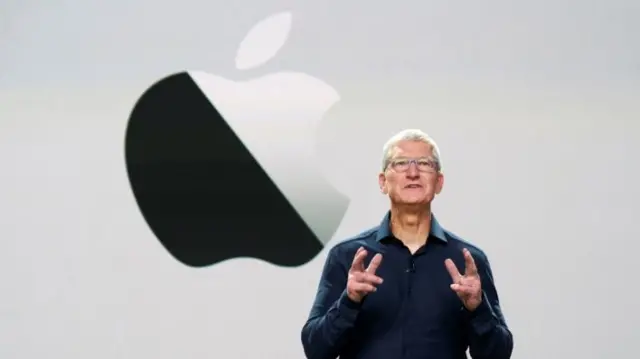 Image source, Reuters
Image source, ReutersApple has tended to attract less anti-trust scrutiny than its rivals - in part because its iPhones and Mac computers are both outsold by Android and Windows rivals.
But in recent times, the firm's stewardship of its App Store has attracted criticism - including a official probe from the EU.
At issue is the fact that Apple doesn't allow apps to be installed onto iOS devices from alternative marketplaces, and that it enforces tough rules over the way subscriptions and other digital items can be sold.
But Mr Cook intends to say that Apple takes a "vastly lower" cut of sales than developers had to share before it launched its store.
"In the more than a decade since the App Store debuted, we have never raised the commission or added a single fee," he will tell the lawmakers.
"In fact, we have reduced them for subscriptions and exempted additional categories of apps.
"The App Store evolves with the times, and every change we have made has been in the direction of providing a better experience for our users and a compelling business opportunity for developers."Read more about how Apple intends to defend its App Store
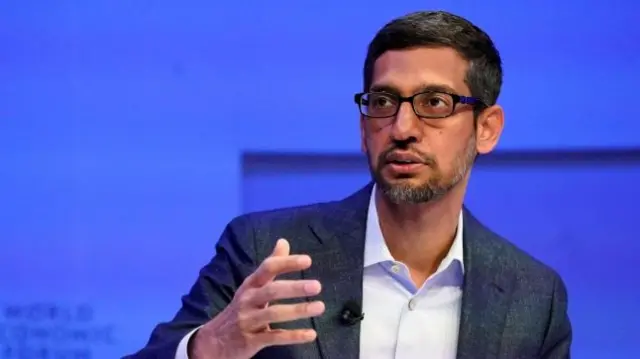 Image source, Getty Images
Image source, Getty ImagesGoogle's dominance of online search - and the ad revenue it generates - has led to accusations that it has abused its market-leading position.
There's also controversy over the way it has used Android to promote its own services. And most recently its takeover of the fitness tracking gadget-maker Fitbit has caused concern because of the extra health data it will gain.
But Sundar Pichai - chief executive of parent company Alphabet - plans to use his opening remarks to suggest the tech industry is so fast-paced that it is not "inevitable" that Google will always fare so well.
"We know Google’s continued success is not guaranteed," he will tell the lawmakers.
"Google operates in highly competitive and dynamic global markets, in which prices are free or falling, and products are constantly improving.
"Today’s competitive landscape looks nothing like it did five years ago, let alone 21 years ago, when Google launched its first product, Google Search."
James Clayton
North America technology reporter
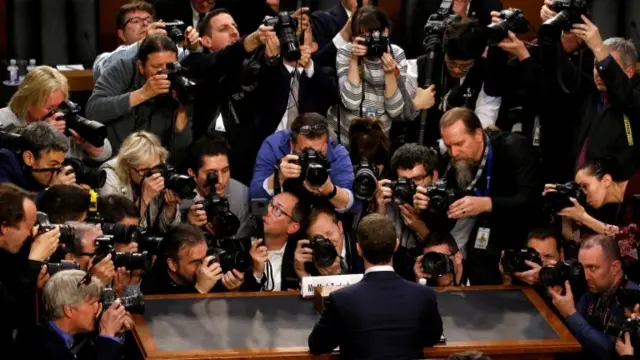 Image source, Reuters
Image source, ReutersWhen Mark Zuckerberg sat down for his congressional grilling in 2018, he looked nervous.
And he was right to be. Hour after hour of interrogation awaited him.
Just him. Nowhere to turn.
This will be different though.
Firstly, perhaps appropriately, it will be virtual. It will be interesting to see whether being questioned online will deliver the same theatre – the same tension.
What will also help the big four is that they’ll be giving evidence together. That’s what anti-trust campaigners didn’t want.
They thought that format would give the tech chiefs safety in numbers – someone else to hide behind.
But ultimately it will be down to legislators to try and create that tension. To try and not let them off the hook. To try to keep them off script.
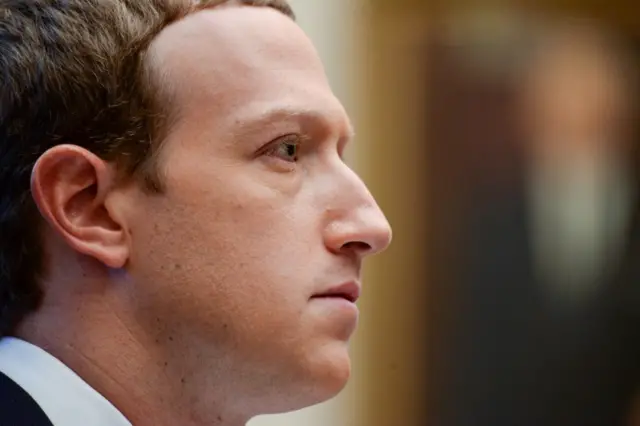 Image source, Reuters
Image source, ReutersDoes big tech stifle competition? Not so, Facebook boss Mark Zuckerberg will argue - if anything, he says, big tech is only possible because of competition.
"Our story would not have been possible without US laws that encourage competition and innovation. I believe that strong and consistent competition policy is vital because it ensures that the playing field is level for all. At Facebook, we compete hard, because we’re up against other smart and innovative companies that are determined to win," he says in prepared remarks.
The Facebook boss is likely to face scrutiny over censorship, a particular sore point among US Republicans.
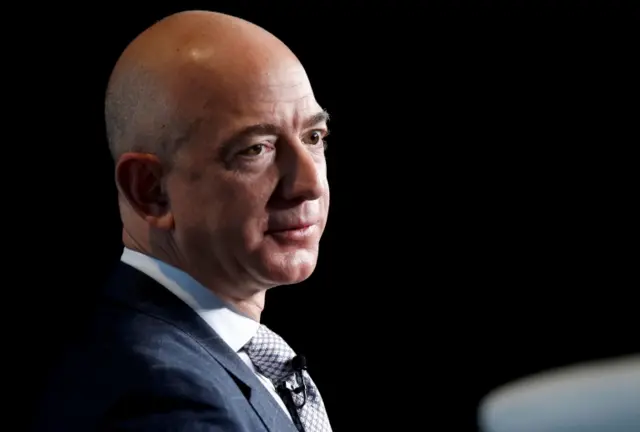 Image source, Reuters
Image source, ReutersPerhaps the mostly keenly awaited testimony will come from Amazon CEO Jeff Bezos. His already vast wealth inflated even more amid the coronavirus pandemic but workers have accused the firm of violating safety standards.
In his opening remarks, Bezos focuses on his company's record on innovation, job creation, and the customers.
"At Amazon, customer obsession has made us what we are, and allowed us to do ever greater things. I know what Amazon could do when we were 10 people. I know what we could do when we were 1,000 people, and when we were 10,000 people. And I know what we can do today when we’re nearly a million. I love garage entrepreneurs - I was one. But, just like the world needs small companies, it also needs large ones. There are things small companies simply can’t do," he says.
He goes on to say: "I believe Amazon should be scrutinised.
"Our responsibility is to make sure we pass such scrutiny with flying colours."
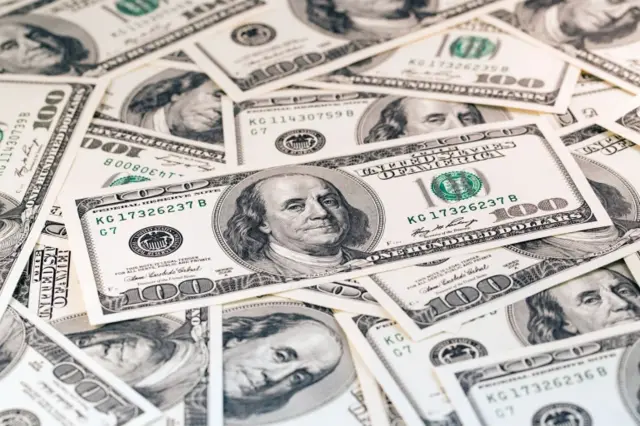 Image source, Getty
Image source, GettyOne of the matters concerning the committee is the degree to which three of the tech companies now control the market for online adverts.
Amazon, Facebook and Google jointly account for more than 62% of internet ad spending in the US, according to market research firm eMarketer.
Amazon’s high placing sometimes surprises people, but if you look closely at its online store you can see many of the products are only as prominent as they are because the brands responsible have paid for a “sponsored” position.
However, Google and Facebook still have a much bigger share.
Facebook’s Instagram division alone now accounts for 12% of the market, and is responsible for the fact its parent company is still seeing ad sales growth.And Google is the biggest player of all, although there have been some forecasts it might see its share shrink this year as a result of a fall in travel industry spending caused by the coronavirus.
Apple does sell some online ads - it lets software publishers buy prominent placings in its App Store - but this represents only a small part of its business.
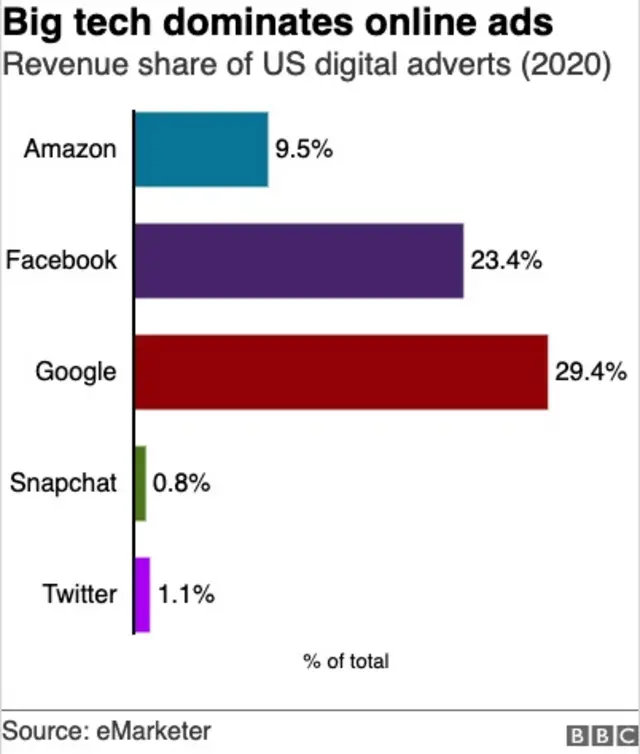
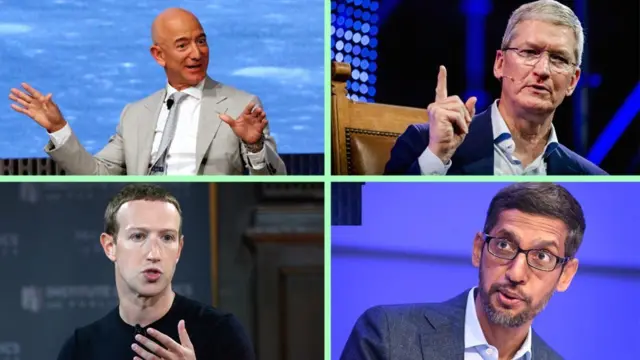 Image source, Getty Images/EPA/Reuters
Image source, Getty Images/EPA/ReutersHello, and welcome to a big day in Washington. In an unprecedented hearing, four of the biggest names in tech will give evidence to members of the US Congress.
Mark Zuckerberg (Facebook), Sundar Pichai (Alphabet, including Google), Tim Cook (Apple) and Jeff Bezos (Amazon) will all face questions over their business practices and their impact on smaller rivals.
Follow us for live updates.